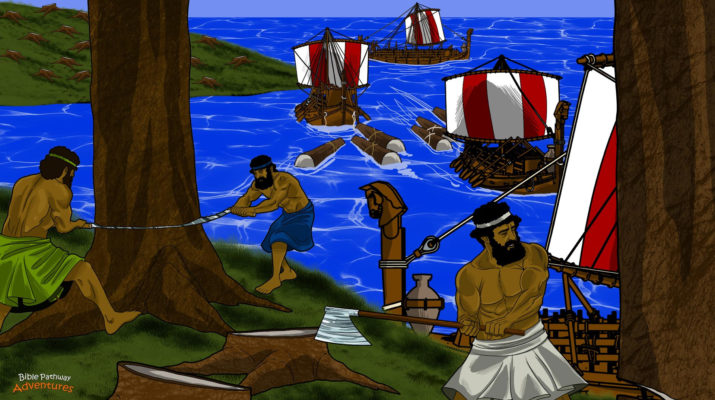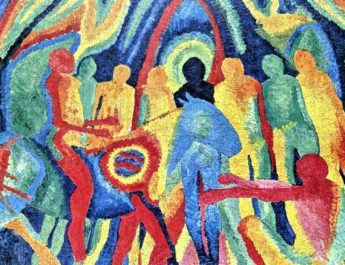1 Kings 5:1-6, 13-14
A Women’s Lectionary 50
1 Now KingA HiramB of TyreC sentD
A “King” = melek. From malak (to be or become king or queen, to rise to the throne, to be crowned; by implication, to take counsel). This is king or royal.
B “Hiram” = Chiram. From Churam (Huram, a name); from Achiram (Ahiram; “brother of the lofty” or “brother of height”); {from ach (brother, kindred, another, other, like) + rum (to be high, rise, exalt self, extol, be haughty; to rise literally or figuratively)} OR from hor (noblemen) + rum (see above). This is Hiram or Chiram, a name that means “most noble,” “high born,” “brother of the lofty.” See https://www.abarim-publications.com/Meaning/Hiram.html
C “Tyre” = Tsor. “From Phoenician “?? (ṣr /Ṣur/, “rock”)”” OR from the same as tsor (flint, stone, knife, edge); from the same as tsar (pebble, flint) or tsur (to confine, cramp, or bind in a literal or figurative sense; to besiege, assault, or distress). This is Tyre, the Phoenician city. Its name may mean “rock.” See https://en.wiktionary.org/wiki/Tyre
D “sent” = shalach. This is to send out, away, send for, forsake. It can also mean to divorce or set a slave free.
his servantsE to SolomonF when he heardG
E “servants” = ebed. From abad (to work, serve, compel; any kind of work; used causatively, can mean to enslave or keep in bondage). This is a servant, slave, or bondservant.
F “Solomon” = Shelomoh. From shalam (to be complete or sound; to have safety mentally, physically, or extending to one’s estate; so, if these things are safe and complete, the implication is that one would be friendly; and, if being friendly, one would make amends and that friendship would be reciprocated). This is Solomon or Shelomoh, meaning “peaceful.” It is the same word as the Hebrew word for peace – shalom.
G “heard” = shama. This is to hear, call, consent, or consider. It implies listening intelligently, giving attention, and, because of these two factors, obedience and action are often implied.
that they had anointedH him king in place of his father,I for Hiram had alwaysJ been a friendK to David.L
H “anointed” = mashach. This is smear, paint, spread, or paint. It can also be to rub with oil or, otherwise stated, to anoint. This implies a consecration. This root verb is where the word “messiah” comes from.
I “father” = ab. This is father, chief, or ancestor. It is father in a literal or figurative sense.
J “always” = kol + yom. Literally, “all of the days.” Kol is from kalal (to complete). This is all or every. Yom has a root that may mean being hot. This is the day in a literal or figurative sense. It can also mean birth, age, daylight, continually or other references to time.
K “been a friend” = aheb + hayah. Aheb is to love, beloved, friend. It is to have affection for sexually or otherwise. Hayah is to be or become, to happen.
L “David” = David. From the same as dod (beloved, love, uncle); the root may mean to boil, which is used figuratively to describe love. So, this implies someone you love such as a friend, a lover, or a close family member like an uncle. David’s name likely means something like “beloved one.”
2 Solomon sent word to Hiram, saying, 3 “You knowM that my father David couldN not buildO a houseP
M “know” = yada. This is to know, acknowledge, advise, answer, be aware, be acquainted with. Properly, this is to figure something out by seeing. It includes ideas of observation, recognition, and care about something. It can be used causatively for instruction, designation, and punishment.
N “could” = yakol. This is to be able, endure, overcome, prevail.
O “build” = banah. This is to build, make, set up, restore, repair, or obtain children. It is to build literally or figuratively.
P “house” = bayit. Related to “build” in v3. Probably from banah (see note O above). This is house, court, family, palace, temple.
for the nameQ of the LordR his GodS becauseT of the warfareU
Q “name” = shem. May be from sum (to put, place, set). This is name, fame, renown. A name was thought to indicate something essential about a person – something about their individuality. So, this word can also mean honor, authority, or character.
R “Lord” = YHVH. Related to “been a friend” in v1. From havah (to be, become) or hayah (see note K above). This is the name of the God of Israel, the self-existent and eternal one, the tetragrammaton. This pronunciation has been lost to time so “Lord” is generally used in its place.
S “God” = Elohim.
T “because” = paneh. From panah (to turn, face, appear). This is face in a literal or figurative sense. It could be face, presence, anger, respect. It can also be used of God to indicate divine favor or presence.
U “warfare” = milchamah. From lacham (to eat or feed on; figuratively, to battle as a kind of consumption/destruction). This is battle, war, fighting, or one who fights (i.e. a warrior).
with which his enemies surroundedV him, until he putW them under the solesX of his feet.Y
V “surrounded” = sabab. This is turning around, going around; to surround, cast, walk, fetch. It is to revolve or border in a literal or figurative sense.
W “put” = natan. This is to give, put, set, offer. It is to give literally or figuratively.
X “soles” = kaph. From kaphaph (to bend – from a root meaning curve or bend down). This is palm of the hand or sole of the foot, footstep, grasp. Figuratively, it can also mean power.
Y “feet” = regel. This is foot, endurance, or journey. It is a foot as the means of walking and so it implies a step or a greater journey. It can be used euphemistically for private parts.
4 But now the Lord my God has given me restZ on every side;AA there is neither adversaryBB nor misfortune.CC
Z “given…rest” = nuach. This is to rest, calm, camp, free, place, remain, satisfy, settle, station, or wait. It is rest and so implies settling down in a literal or figurative sense. This is perhaps the root verb of the name “Noah.”
AA “on every side” = sabib. Related to “surrounded” in v3. From sabab (see note V above). This is a circuit or a circle. It could refer to an environment, one’s neighbors, or a circular path round about.
BB “adversary” = satan. Perhaps from satan (to be an adversary, attack, accuse, resist). This is an adversary. It could be personal, in reference to political enemies, or refer to Satan.
CC “misfortune” = pega + ra’. Literally, “evil occurrence.” 2x in OT. Pega is from paga (to meet or happen, whether unintentionally or of violence; to plead, spare, reach, or intercede). This is occurrence or chance. Ra’ is from ra’a’ (to be evil, bad, afflict; properly, to spoil – to destroy by breaking into pieces; figuratively, to cause something to be worthless; this is bad in a physical, social, or moral sense; that which displeases, to do harm or mischief, to punish or vex). This is bad, disagreeable, that which causes pain, misery, something having little or no value, something that is ethically bad, wicked, injury, calamity. This refers to anything that is not what it ought to be – a natural disaster, a disfigurement, an injury, a sin.
5 SoDD I intend to build a house for the name of the Lord my God, as the Lord saidEE to my father David, ‘Your son,FF whom I will setGG on your throneHH in your place, shall build the house for my name.’
DD “so” = hen. This is a remark of surprise or excitement: lo! Behold! It can also mean if or though.
EE “said” = dabar. This is generally to speak, answer, declare, or command. It might mean to arrange and so to speak in a figurative sense as arranging words.
FF “son” = ben. Related to “build” and “house” in v3. This is son, age, child. It is son in a literal or figurative sense.
GG “set” = natan. Same as “put” in v3. See note W above.
HH “throne” = kisse. From the same as kese (full moon); perhaps from kasah (to cover, conceal, overwhelm; to cover as clothes do or to hide a secret). This is throne – a seat that is covered or has a canopy. Thus, it is a seat that conveys authority.
6 Therefore commandII that cedarsJJ from the LebanonKK be cutLL for me. My servants will joinMM your servants, and I will giveNN you
II “command” = tsavah. This is to charge, command, order, appoint, or enjoin. This is the root that the Hebrew word for “commandment” comes from (mitsvah).
JJ “cedars” = erez. Perhaps from araz (made from cedar; to be firm, strong). This is cedar or a cedar tree as strong.
KK “Lebanon” = Lebanon. From laben (to be white, make white, make bricks) OR form Aramaic lebab (heart); corresponding to Hebrew lebab (heart, courage, one’s inner self, the mind, or the will). This is Lebanon. The sense of “white” comes from the snow on the top of its mountains. See https://en.wikipedia.org/wiki/Lebanon
LL “cut” = karat. This is to cut down, cut off, or make a covenant (idiom for making a covenant is “to cut a covenant”). It can also mean to destroy, fail, or consume.
MM “join” = hayah. Same as “been a friend” in v1. See note K above.
NN “give” = natan. Same as “put” in v3. See note W above.
whateverOO wagesPP you set for your servants, for you know that there is no oneQQ among us who knows how to cut timberRR like the Sidonians.”SS
OO “whatever” = kol. Same as “always” in v1. See note J above.
PP “wages” = sakar. From sakar (to hire, reward, earn). This is wages, payment, service, salary, worth, reward, or benefit.
QQ “one” = ish. Perhaps from enosh (human, humankind, mortal); from anash (to be weak, sick, or frail). This is man, husband, another, or humankind.
RR “timber” = ets. Perhaps from atsah (to shut, fasten, firm up, to close one’s eyes). This is tree or other things related to trees like wood, sticks, or stalks. It can also refer to wood products like a plank or staff or gallows. Additionally, this can refer to a carpenter.
SS “Sidonians” = Tsidoni. 16x in OT. From Tsidon (Sidon – a city in Phoenicia); from Phoenician tsydon (Sidon; probably meaning fishery or fishing town). This is Sidonian or Zidonian. See https://en.wiktionary.org/wiki/Sidon & https://en.wikipedia.org/wiki/Sidon
13 King Solomon conscriptedTT forced laborUU out of allVV Israel;WW
TT “conscripted” = alah. This is to go up, approach, ascend, be high, be a priority; to arise in a literal or figurative sense.
UU “forced labor” = mas. Perhaps from masas (to melt, discourage, faint; to deteriorate from a sickness or weaken because of sleepiness or an emotional response). This is a burden that creates weariness and or exhaustion. It is forced labor, taskwork, or other levy.
VV “all” = kol. Same as “always” in v1. See note J above.
WW “Israel” = Yisrael. Related to “God” in v3. From sarah (to persist, exert oneself, contend, persevere, wrestle, prevail) + el (see note S above). This is Israel, meaning God strives or one who strives with God; new name for Jacob and for his offspring. This refers to the people and to the land.
the levyXX numberedYY thirtyZZ thousandAAA men.BBB
XX “levy” = mas. Same as “forced labor” in v13. See note UU above.
YY “numbered” = hayah. Same as “been a friend” in v1. See note K above.
ZZ “thirty” = sheloshim. From the same as shalosh (three, fork, triad). This is thirty or thirtieth.
AAA “thousand” = eleph. Perhaps from the same as eleph (herd, cattle); from alaph (to learn, speak, associate with). This is thousand.
BBB “men” = ish. Same as “one” in v6. See note QQ above.
14 He sent them to the Lebanon, tenCCC thousand a monthDDD in shifts;EEE
CCC “ten” = eser. Perhaps from asar (to tithe, render a tenth of). This is ten or -teen. While 7 is symbolically the number of perfection, ten is also symbolically a number of perfection (but to a lesser degree than 7 is).
DDD “month” = chodesh. From chadash (to renew, repair). This refers to a new moon. It can also mean monthly.
EEE “shifts” = chaliphah. 12x in OT. From chalaph (to slide by or rush like a flood; to pass through, change, sprout, renew, break a promise, pierce, or violate). This is a change, alternation, release, shift, change of clothing.
they would beFFF a month in the Lebanon and twoGGG months at home;HHH AdoniramIII was in charge of the forced labor.
FFF “be” = hayah. Same as “been a friend” in v1. See note K above.
GGG “two” = shenayim. From sheni (double, again, another, second); from shanah (to fold, repeat, double, alter, or disguise). This is two, both, second, couple.
HHH “home” = bayit. Same as “house” in v3. See note P above.
III “Adoniram” = Adoniram. Related to “Hiram” in v1. 2x in OT. From adon (lord, master, owner) + rum (see note B above). This is Adoniram, meaning “my Lord is exalted” or “lord of height.”
Image credit: “Solomon the Temple Builder” by Curtis and Pip Reid of Bible Pathway Adventures.




